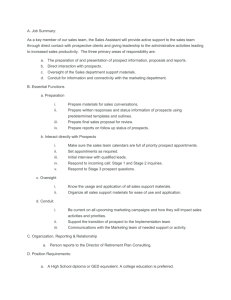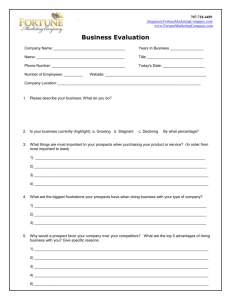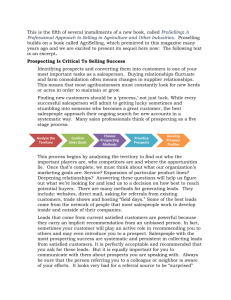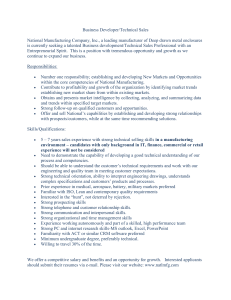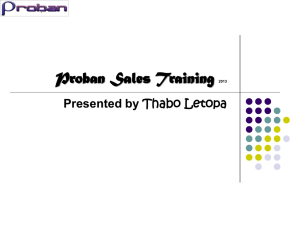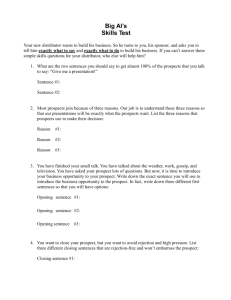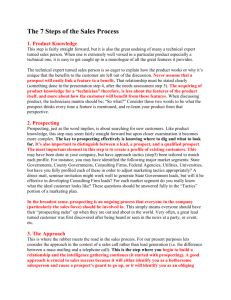The 7 Core Sales Competencies By Tony Cole, President & CEO
advertisement
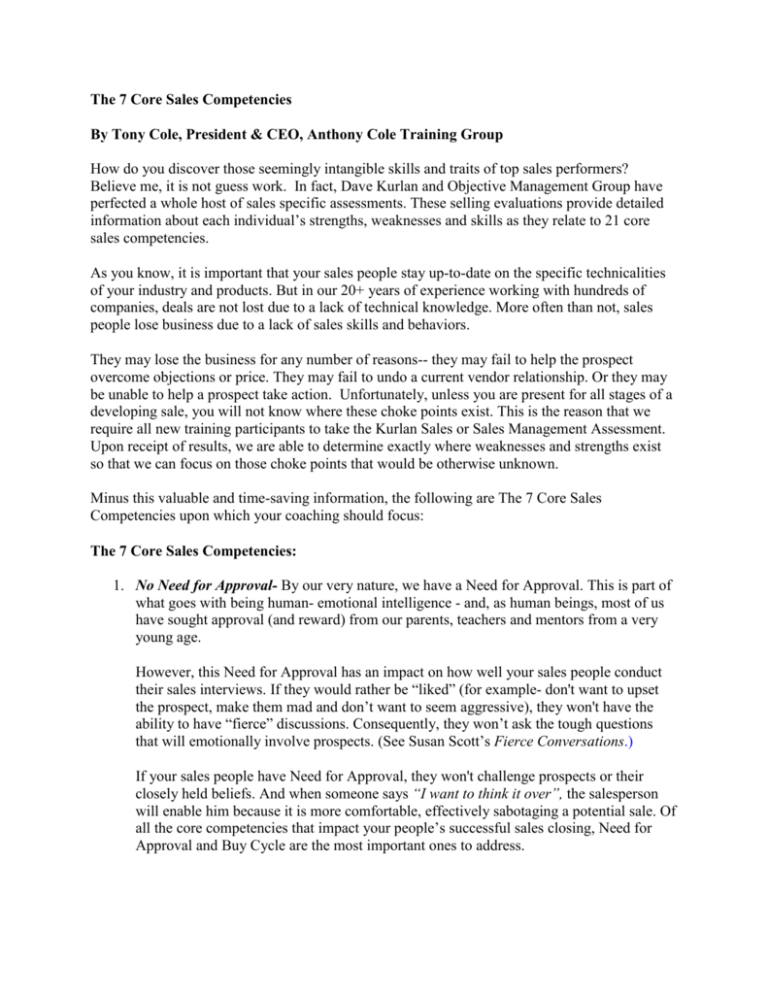
The 7 Core Sales Competencies By Tony Cole, President & CEO, Anthony Cole Training Group How do you discover those seemingly intangible skills and traits of top sales performers? Believe me, it is not guess work. In fact, Dave Kurlan and Objective Management Group have perfected a whole host of sales specific assessments. These selling evaluations provide detailed information about each individual’s strengths, weaknesses and skills as they relate to 21 core sales competencies. As you know, it is important that your sales people stay up-to-date on the specific technicalities of your industry and products. But in our 20+ years of experience working with hundreds of companies, deals are not lost due to a lack of technical knowledge. More often than not, sales people lose business due to a lack of sales skills and behaviors. They may lose the business for any number of reasons-- they may fail to help the prospect overcome objections or price. They may fail to undo a current vendor relationship. Or they may be unable to help a prospect take action. Unfortunately, unless you are present for all stages of a developing sale, you will not know where these choke points exist. This is the reason that we require all new training participants to take the Kurlan Sales or Sales Management Assessment. Upon receipt of results, we are able to determine exactly where weaknesses and strengths exist so that we can focus on those choke points that would be otherwise unknown. Minus this valuable and time-saving information, the following are The 7 Core Sales Competencies upon which your coaching should focus: The 7 Core Sales Competencies: 1. No Need for Approval- By our very nature, we have a Need for Approval. This is part of what goes with being human- emotional intelligence - and, as human beings, most of us have sought approval (and reward) from our parents, teachers and mentors from a very young age. However, this Need for Approval has an impact on how well your sales people conduct their sales interviews. If they would rather be “liked” (for example- don't want to upset the prospect, make them mad and don’t want to seem aggressive), they won't have the ability to have “fierce” discussions. Consequently, they won’t ask the tough questions that will emotionally involve prospects. (See Susan Scott’s Fierce Conversations.) If your sales people have Need for Approval, they won't challenge prospects or their closely held beliefs. And when someone says “I want to think it over”, the salesperson will enable him because it is more comfortable, effectively sabotaging a potential sale. Of all the core competencies that impact your people’s successful sales closing, Need for Approval and Buy Cycle are the most important ones to address. 2. Supportive Buy Cycle- Each of us has a Buy Cycle. This Buy Cycle is either supportive of effective selling or destructive to effective selling. This means that if your sales person is purchasing and if he likes to “think things over”, he will be vulnerable to letting prospects do the same. This is bad. A good sales person always has a sense of urgency in closing sales and allowing think-it-overs only lengthens the sales cycle. While the business might eventually come through, your job is to focus on helping sales people implement a more effective and efficient selling process. And you need to help your sales person understand that if he likes to think things over and is a price-shopper, he will likely identify and accommodate prospects with similar behaviors. Once he recognizes this interferes with his own success and limits his income, he can perform differently when in selling situations. 3. Recovers Quickly from Rejection- Most of us have developed some fear of rejection in our lifetimes. Salespeople usually learn to overcome this fear. But do you know what happens after your sales person is rejected? How long does it take for him to recover? If he hears “no” at 10:00 am, is he still unable or unwilling to make calls at 2:00 pm? An inability to recover from rejection will impact a sales person’s ability to perform consistently. Of course, a robust pipeline will help sales people overcome rejection, but a robust pipeline relies upon consistent prospecting. Unfortunately if sales people have trouble recovering from rejection, their prospecting activity is affected. This is similar to the old adage about “which comes first? The chicken or the egg? Bottom line? Sales people must learn to move from one call to the next, brushing off rejection in the process. 4. Comfortable Talking About Money- It might seem strange that this should be a problem for sales people, but we see this weakness regularly in the results of our sales evaluations. If your sales people avoid talking about money, they are skipping an important early step in the sales process that will affect long term outcomes. Find out ASAP if your sales people have the ability to talk through this crucial element up front. If a sales person hears money objections during final presentations, he either (1) thinks (incorrectly) that this step is not important to the initial sales process, or (2) he is uncomfortable talking about money. 5. Consistent, Effective Prospecting- According to Dave Kurlan's book Baseline Selling, the consistent nature of prospecting is more important than being effective in technique. If your sales people prospect consistently enough, they will turn suspects into prospects. Once they begin to prospect consistently, it is time for them become skillful and more effective. If your sales people have opportunities that seem to be stuck, inconsistent prospecting and/ or ineffective qualifying could be contributing. 6. Reaches Decision Makers- Your sales people’s ability to get to decision makers at the beginning of the sales process is critical to their ability to quickly qualify and close more business, more quickly at higher margins. If they don't get to decision makers, they are setting themselves up for longer sales cycles, lower closing ratios, and wasted time spent on contacts that cannot say “yes”. 7. Effective Questioning and Listening- Two most critical selling skills are asking quality questions and intent listening. Your sales people will be most successful if they pre-plan their meetings, writing the specific questions they will ask in order to qualify a prospect. Help them understand that the key to quality listening is to stop thinking ahead during the call, stop taking notes. Help your sales people focus on listening closely so that they will best understand the prospect and his issues. As a result, they will ask better questions. How would you rate your sales people in each of The 7 Core Sales Competencies? Perhaps more importantly, how do you rate your coaching skills to help them fix choke points specific to The 7 Core Sales Competencies? (keywords: sales competencies, closing business, effective selling, sales process) Tony Cole’s Bio Tony Cole’s Sales Brew blog www.anthonycoletraining.com (877) 635-5371 ©ACTGLLC 2012
